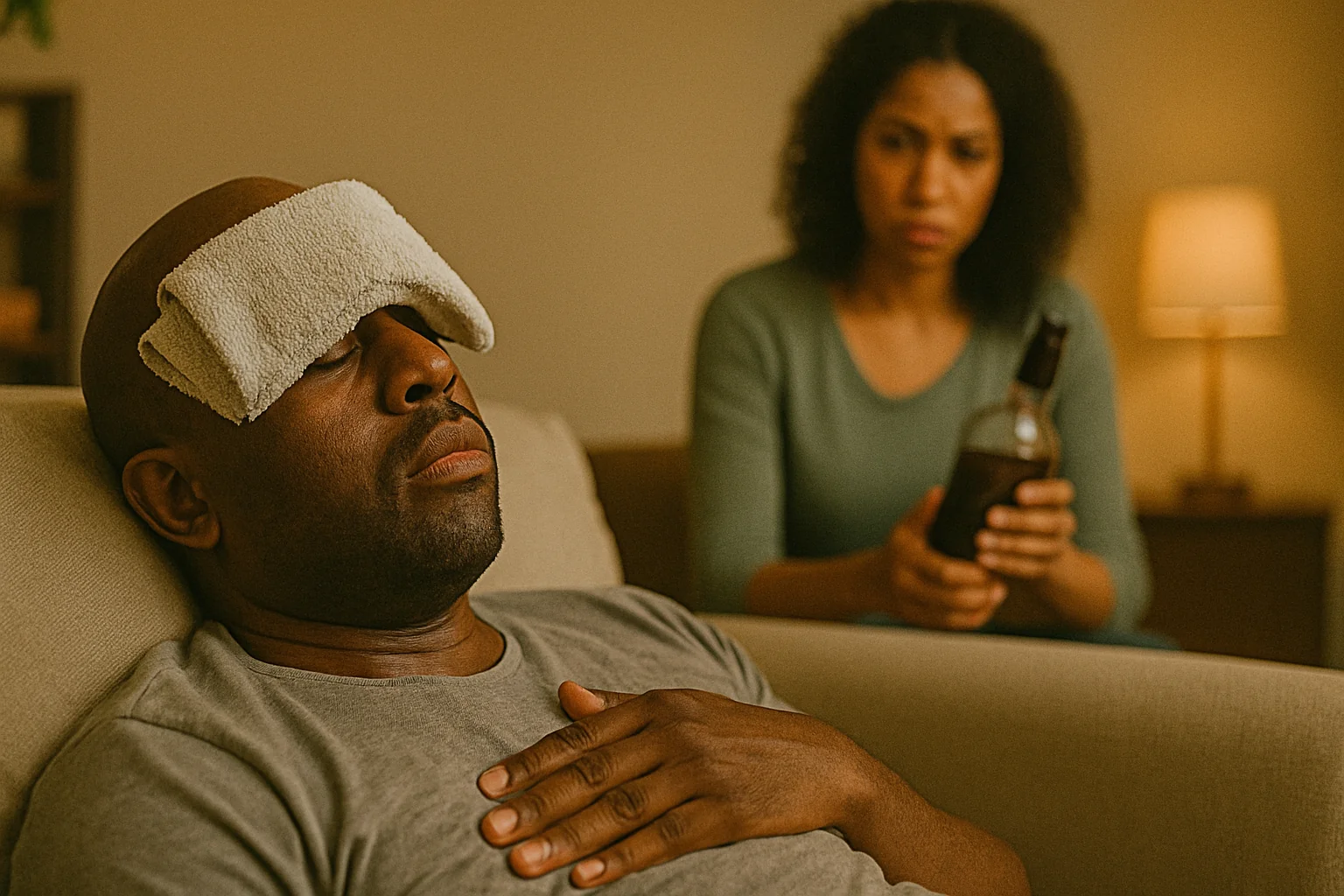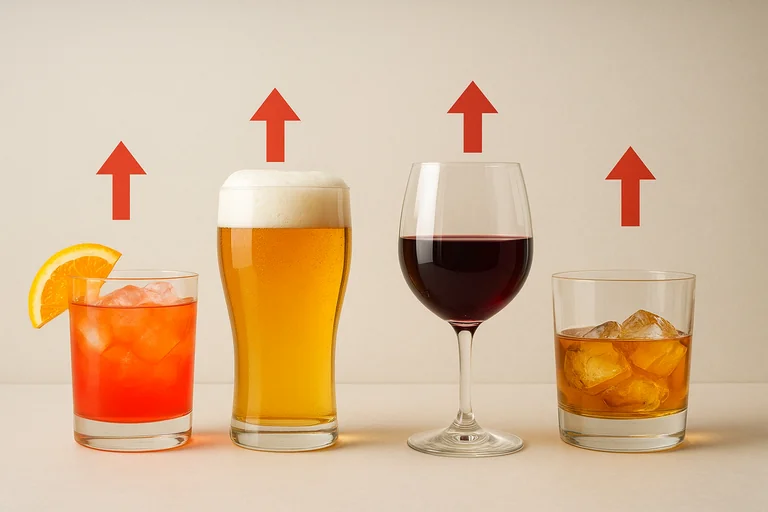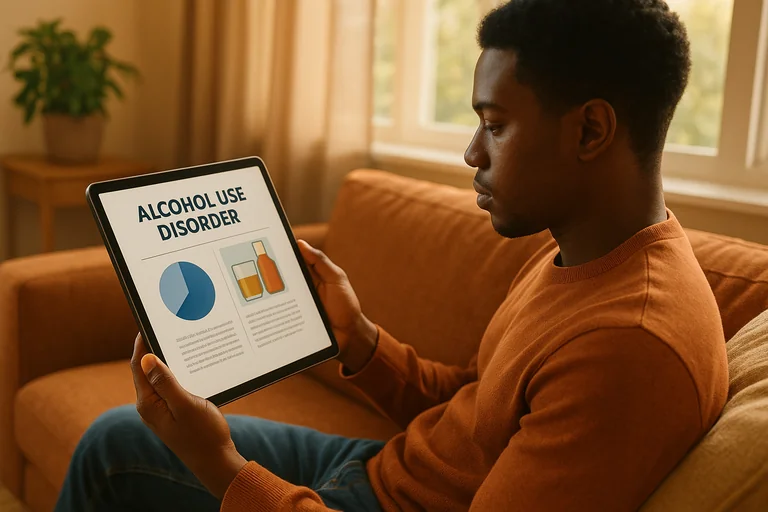A 2 minute assessment to get a personalized mental health or alcohol recovery plan.
You wake up after a night of drinking, and it's not just your head that's pounding. Your whole body aches. Your muscles are sore, your joints are stiff, and you feel like you've run a marathon you don't remember signing up for. This is a common, yet often confusing, experience.
What You'll Discover:
- What to do when you experience body aches and muscle soreness after drinking
- Steps to take to determine if your symptoms are normal hangover effects or something more serious
- The importance of understanding when body pain after alcohol requires medical attention
The idea of body aches after drinking may be concerning to some people, but it's actually been a documented medical symptom for decades. When traditional "just tough it out" approaches fail repeatedly, causing widespread confusion about what's normal versus concerning, many people assume it's just part of a bad hangover. With modern understanding of alcohol's effects on muscle tissue, inflammatory responses and other physiological processes now available, it's actually very straightforward to understand what's happening to your body and when to seek help.
So, how do body aches after drinking work exactly? It's actually much more complex than you think with multiple body systems involved.
Do Your Research About Alcohol's Effects on Your Muscles
Before you begin taking steps to address body aches after drinking, it's important to learn about how alcohol affects your musculoskeletal system and overall physical health. In particular you want to look up information on:
- How alcohol causes inflammation and affects muscle recovery
- What chronic alcohol consumption does to your body systems
- When muscle pain and body aches require immediate medical evaluation
Medical conditions are triggered by different factors, and alcohol-related body aches are the perfect example. It's not just for people with severe alcohol use disorder who drink heavily every day. It's also appropriate for people who want to understand why even occasional binge drinking can cause significant muscle soreness and physical discomfort.
No matter what your drinking pattern, it's always best to know as much as you can about alcohol's effects on your body before dismissing concerning symptoms.
Choose to Get Proper Medical Assessment
The next part takes medical evaluation as well. You'll need to determine whether your body aches are normal hangover symptoms you can manage at home or signs of a serious condition requiring immediate medical attention. This is an extremely important distinction that goes well beyond just hoping the pain will go away.
You'll want to make sure that you understand the warning signs of conditions like alcoholic myopathy to ensure you get appropriate medical care when needed. Experience with alcohol-related medical issues is also extremely important. Healthcare providers who have been treating alcohol's effects on the body for years and specialize in addiction medicine are going to be well-equipped to help with proper diagnosis and treatment.
Take an Assessment of Your Symptoms
The medical provider you choose should evaluate your specific symptoms to determine whether you're experiencing normal hangover effects or something more serious. This is a crucial part of the process for understanding what level of medical intervention may be necessary.
This assessment is a simple yet crucial part of the process for determining what type of care will be most appropriate for your situation. It also provides healthcare providers with baseline information that will be important in subsequent steps of the diagnostic process.
Choose the Right Level of Medical Care
If concerning symptoms are identified after your assessment you can discuss treatment options and develop a plan with your healthcare provider. With evidence-based medical approaches there are several proven strategies for addressing alcohol-related health issues as well as ongoing monitoring and support.
Have Your Medical Consultation
The most essential step in addressing persistent body aches after drinking is having a thorough evaluation with a healthcare provider who understands alcohol's effects on the body. They will:
- Go over your drinking history and current consumption patterns
- Discuss your symptoms and how often they occur
- Listen to your concerns about muscle pain and physical discomfort
This will help the provider determine what diagnostic tests may be needed and whether your symptoms indicate a serious underlying condition. If so, the healthcare provider will go over your treatment options and provide information on lifestyle changes that may be necessary.
Begin Following Medical Recommendations
After your medical consultation, you'll start implementing the treatment plan your healthcare provider recommends. This might include medications for inflammation, physical therapy protocols, or lifestyle modifications depending on your specific diagnosis.
The treatment will focus on addressing the underlying cause of your body aches while reducing your risk of future complications. It's extremely important to follow medical advice exactly as prescribed, especially when it comes to alcohol consumption and medication interactions.
Take the Lifestyle Changes Seriously
Once you understand what's causing your body aches after drinking you can begin making the necessary changes to prevent future episodes. There will be specific recommendations about alcohol consumption, nutrition, exercise, and other factors that affect muscle health and recovery.
It's extremely important to implement these changes exactly as your healthcare provider recommends, particularly when it comes to reducing alcohol intake that may be contributing to your symptoms.
Follow-Up to Monitor Your Recovery
Having ongoing follow-up appointments with your healthcare provider is highly beneficial in ensuring your symptoms improve and serious complications don't develop. It gives you the opportunity to discuss your progress and for your treatment plan to be adjusted, if needed.
The provider can also help you monitor important health markers and catch any signs of conditions like alcoholic myopathy before they become severe.
Why Your Body Works Against You When You Drink
Don't let outdated ideas about alcohol being harmless in moderation fool you into thinking that body aches after drinking are just normal hangover symptoms you should ignore. The criteria for what makes alcohol potentially damaging to your muscles and other body systems is clear based on extensive medical research.
Many emergency physicians, addiction specialists and muscle health experts will tell you that alcohol affects your musculoskeletal system in multiple ways. Even people who don't drink daily can experience significant body aches, and it's particularly concerning because chronic alcohol consumption can lead to serious conditions like alcoholic myopathy that cause permanent muscle damage.
Now that you have a better idea of what's happening to your muscles when you drink, let's delve further into the specific causes of body aches after alcohol and when you should be most concerned.
The Undeniable Truth About Alcohol and Body Aches
The undeniable truth is that alcohol affects your body in multiple ways that can cause significant muscle soreness and physical discomfort. According to Confidant Health, a digital health platform specializing in alcohol use treatment, there are six common culprits behind post-drinking body aches.
Dehydration and Muscle Function
Alcohol is a powerful diuretic that causes you to lose fluids much faster than normal. When your muscles don't have adequate hydration, they can't function properly and you'll experience cramping, stiffness, and soreness.
This dehydration also leads to electrolyte imbalances that affect muscle contraction and relaxation, making you feel weak and achy throughout your body.
Toxic Inflammation Response
When your body breaks down alcohol, it creates a toxic compound called acetaldehyde that triggers a full-body inflammatory response. Your immune system releases inflammatory chemicals called cytokines that cause the same aches and pains you'd feel with the flu.
This systemic inflammation can make every muscle in your body feel sore and tender, even if you haven't been physically active.
Impaired Muscle Recovery
If you've exercised recently, alcohol significantly slows down your muscle recovery process by reducing production of human growth hormone. This means normal muscle repair is delayed, leaving you with prolonged soreness and stiffness.
Your muscles simply can't heal and rebuild as efficiently when alcohol is in your system, making any existing soreness much worse.
Coordination Problems and Injuries
Alcohol impairs your balance and coordination, making you much more likely to bump into things, fall, or sustain minor injuries you might not even remember. You may wake up with unexplained bruises and muscle soreness from accidents that occurred while you were impaired.
Electrolyte Depletion
If your drinking involved vomiting, you've lost crucial electrolytes like potassium, magnesium, and sodium that are essential for proper muscle function. Without these minerals, your muscles can't contract and relax normally, leading to cramps and weakness.
Sleep Quality Disruption
Alcohol severely disrupts your sleep quality, preventing your body from completing its normal overnight muscle repair processes. Poor sleep leaves you feeling physically beaten down and sore even without other contributing factors.
NEED TO KNOW: While these six causes explain most body aches after drinking, persistent or severe muscle pain could indicate alcoholic myopathy, a serious condition that requires immediate medical attention.
When Body Aches Signal Something More Dangerous
What's most concerning about body aches after drinking is when they indicate alcoholic myopathy, a condition where alcohol actually destroys your muscle tissue. According to American Addiction Centers, this condition affects between 40% and 60% of people with chronic alcohol use disorder.
Acute Alcoholic Myopathy
This medical emergency can occur after a single episode of heavy binge drinking. Symptoms include sudden onset of intense muscle pain, swelling, significant weakness, and dark reddish-brown urine.
The dark urine indicates rhabdomyolysis, where muscle tissue breaks down so rapidly that it can cause kidney failure. This requires immediate emergency medical treatment.
Chronic Alcoholic Myopathy
This develops gradually over months or years of heavy drinking. You'll notice progressive muscle weakness and wasting, particularly in your hips and shoulders, making everyday tasks like climbing stairs increasingly difficult.
While some muscle damage can be reversed by stopping drinking, much of it may be permanent. Early recognition and intervention are crucial.
The scary reality is that by the time you notice symptoms of chronic alcoholic myopathy, significant irreversible damage has already occurred to your muscle tissue.
Managing Body Aches and When to Seek Help
If you're experiencing body aches after drinking, there are several immediate steps you can take for relief:
- Rehydrate aggressively with water and electrolyte-containing beverages
- Rest completely and avoid any strenuous physical activity
- Take warm baths to soothe sore muscles and reduce stiffness
- Use anti-inflammatory medications cautiously, as they can irritate an already sensitive stomach
- Focus on nutrient-rich foods to support your body's recovery process
However, you should seek immediate medical attention if you experience:
- Severe or persistent muscle pain that doesn't improve
- Muscle weakness that interferes with daily activities
- Dark-colored urine, which may indicate muscle breakdown
- Difficulty walking, climbing stairs, or performing normal tasks
These symptoms could indicate alcoholic myopathy or other serious complications that require professional medical intervention.
The Connection Between Body Pain and Alcohol Problems
If you're consistently experiencing body aches after drinking, it's a clear warning sign that alcohol is causing more damage to your body than you may realize. These symptoms represent your muscles and other body systems struggling to cope with alcohol's toxic effects.
The most effective way to prevent future episodes and protect your long-term health is to address your drinking patterns directly. For many people, this is much more challenging than it sounds, especially if physical dependence has developed.
If you're struggling to reduce your drinking on your own, it's not a personal failure—it may indicate that you need professional support to break the cycle safely and effectively.
Modern treatments can help you regain control over your drinking while protecting your health. Medications like naltrexone can significantly reduce alcohol cravings by blocking the pleasurable effects, making it much easier to cut back or stop drinking entirely.
When combined with medical support and lifestyle changes, these evidence-based treatments can help you break free from the cycle of drinking and body pain that's affecting your quality of life.
Don't wait for your symptoms to worsen or for permanent muscle damage to occur. Taking action now to address both your drinking and your physical symptoms can prevent serious complications and help you regain your health and vitality.
A confidential online assessment can be a simple, pressure-free way to explore your options and see if professional treatment might help you break free from the cycle of alcohol-related body aches.
Ready to learn more about your options? Take our Alcohol Use Assessment to get started.




